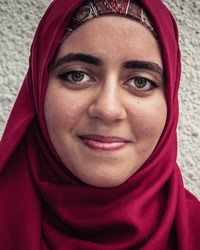Bosniaks are an ethnic group living in the Southeastern part of Europe, mainly in Bosnia and Herzegovina. It is proposed that their 'genetic roots' are reflective of numerous pre-historic components, especially signatures thought to be 'autochthonous' to the Dinaric region, where the historical Illyrians later appeared.
The earliest known inhabitants of the area now known as Bosnia and Herzegovina were the Illyrians, who spoke a language related to modern Albanian. The Romans conquered Illyria after a series of wars, and Latin-speaking settlers from all over the empire settled among the Illyrians.
In the Seventh Century, Slavs settled in Bosnia, Herzegovina, and the surrounding lands. In 1463 the Turkish Ottoman Empire conquest at that time the independent Bosnian kingdom and it was the beginning of the influence of Islamic Civilization in Bosnia and Herzegovina.
Considering the fact that the religious situation in Bosnia-Herzegovina before the Turkish conquest was complex and unclear, the large number of Slav population in Bosnia- Herzegovina converted to Islam. Prior to 1463, Eastern Orthodoxy was probably limited to the upper Drina River valley, which was predominantly Orthodox. The rest of Bosnia was nominally Roman Catholic, with a large segment of the population belonging to an indigenous Bosnian Church (Krstjani). The Krstjani were considered heretics by both the Roman Catholic Church and the Orthodox Church. Modern historians have debated whether the Krstjani were a branch of the Bogomils, a Manichean sect which originated in Bulgaria, or whether they were members of the Roman Catholic church who had acquired some heretical beliefs and influences from Eastern Orthodoxy and fell into Schism. Part of the resistance of the Bosnian Church was political; during the fourteenth century, the Roman Church placed Bosnia was placed under a Hungarian bishop, and the schism may have been motivated by a desire for independence from Hungarian domination. Because of Bosnia's mountainous and inaccessible terrain and its remote location on the borderland between the Roman Catholic and Eastern Orthodox churches, control by church authorities was weak. Historically it was thought that the Krstjani, who were persecuted by both the Roman Catholic and Eastern Orthodox churches, accounted for many of the converts to Islam.
Although the Ottomans did not, as a rule, actively seek to convert their Christian subjects to Islam, it is thought that the greater rights afforded to Muslims in the Ottoman Empire motivated Christians to convert to Islam.
As the Ottoman Empire began to contract after the defeat at Vienna in 1683, many Muslim refugees from the lost Ottoman territories in Croatia, Slavonia, Hungary, and many centuries later Serbia found refuge in Bosnia-Herzegovina, and were assimilated into the local Bosniak population.
When Bosnia and Herzegovina was occupied and administered by Austria-Hungary in 1878, and a number of Bosniaks left Bosnia and Herzegovina. Official Austro-Hungarian records show that 56,000 people emigrated between 1883 and 1920, but the number of emigrants is probably larger, as they don't reflect emigration before 1883, and don't include those who left without permits.
Another wave of Bosniaks emigration occurred after the end of the First World War, when Bosnia and Herzegovina became part of the Kingdom of Serbs, Croats, and Slovenes, known after 1929 as Yugoslavia.
After the Second World War, Bosnia and Herzegovina became one of the six republics of Socialistic Federative Republic of Yugoslavia. In Yugoslavia, unlike the preceding Austro-Hungarian Empire, Bosniaks were not allowed to declare themselves as Bosniaks. As a compromise, the Constitution of Yugoslavia was amended in 1968 to list Muslims by nationality recognizing a nation, but not the Bosniak name. The Yugoslav "Muslim by nationality" policy was considered by Bosniaks to be neglecting and opposing their Bosnian identity because the term tried to describe Bosniaks as a religious group not an ethnic one. When Bosnia declared independence from Yugoslavia, most people who used to declare as Muslims began to declare themselves as Bosniaks.
In the late 1990s, the Bosniaks and Croatians were both attacked by the Serbs, and thousands needed to flee as refugees. There is now a notable Bosniak diaspora in a number of countries including Austria, Germany, Australia, Sweden, Turkey and the United States.
Bosniaks are re-establishing their lives in Switzerland. Often they do practical work like plumbing, construction and electrical work. Some are businessmen.
As former members of now-defunct Yugoslavia, the Bosniaks are used to learning other languages. The Swiss dialect of German is what they are learning today.
Most Bosniaks are Sunni Muslim, although historically Sufism has also played a significant role among them.
For many Bosniaks, Islamic identity has more to do with cultural roots than with religious beliefs. Even among most religious Bosniaks, there is a disdain for religious leaders exercising any influence over day-to-day life. Bosniaks are no different than other Muslims in that they view Islam from the foundation that is their culture.
The tragedy of the Bosniaks has been vividly portrayed to the world by the media. The destruction of towns and villages, expulsion of their inhabitants, systematic looting, and raping of women have left deep scars and an abiding hatred between communities that once lived together and even intermarried.
The Bosnians are one of Europe's least evangelized peoples. Switzerland has a strong Christian history, but most Swiss are very secularized. Who will take the gospel to Muslim Bosniaks in Switzerland?
Pray that God will grant wisdom and favor to the mission agencies that are currently working among Bosnians.
Ask God to encourage the few known Bosnian believers in this region.
Pray that God will meet the physical, spiritual and emotional needs of Bosnians.
Ask the Lord to raise strong local churches among Bosnians.
Scripture Prayers for the Bosniak in Switzerland.
Gotiva
https://en.wikipedia.org/wiki/Immigration_from_the_former_Yugoslavia_to_Switzerland
https://www.reddit.com/r/askswitzerland/comments/18rvzg2/looking_out_for_my_fellow_bosnians_living_in/
| Profile Source: Joshua Project |











